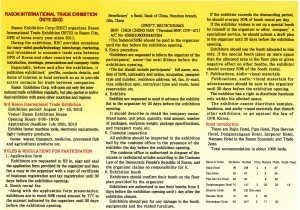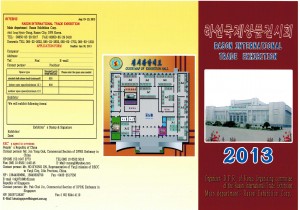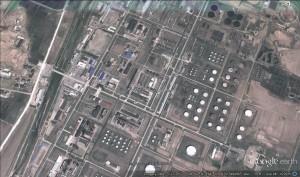UPDATE 1 (2013-10-15): Yonhap reports on the activities carried out at the expo:
North Korean companies participating in an annual trade fair with China signed a total of 93 preliminary deals worth US$1.6 billion at the event, China’s state media reported Tuesday.
North Korea and its economic lifeline, China, wrapped up the trade expo, the second of its kind, on Monday in the Chinese border city of Dandong with some 130 North Korean firms attending the five-day exhibition.
The North Korea-China Economic, Trade, Culture and Tourism Expo came as China has been deepening its economic ties with the North even though Beijing appears to have become increasingly frustrated with Pyongyang’s nuclear weapons program.
During the trade fair, preliminary investment deals worth $510 million and export deals worth $1.09 billion were signed, the official China News Service reported.
North Korea and China held the inaugural trade fair last year, with $1.26 billion worth of preliminary deals signed.
In the first eight months of this year, two-way trade between North Korea and China stood at $4.09 billion, compared with $4.1 billion for the same period last year, South Korean government data showed.
ORIGINAL POST (2013-10-10): According to Yonhap:
An annual trade fair between North Korea and China kicked off in the Chinese border city of Dandong on Thursday, with some 130 North Korean firms attending the five-day exhibition, organizers said.
The North Korea-China Economic, Trade, Culture and Tourism Expo, the second of its kind, comes as China is deepening its economic ties with the North even though Beijing appears to have become increasingly frustrated with Pyongyang’s nuclear weapons program.
About 500 North Koreans, including a 115-member propaganda troupe, joined the exhibition that features 700 booths for products ranging from foods and garments to mining and machinery equipment, according to the China Council for the Promotion of International Trade (CCPIT), which organized the event.
Of the booths, about 200 were allocated to buyers from Pakistan, Malaysia, India, Russia, Hong Kong and Taiwan, a Dandong branch of the CCPIT said.
North Korea and China held the inaugural trade fair last year, with US$1.26 billion worth of preliminary deals signed.
According to Xinhua:
The second China-DPRK economic, trade, culture and tourism expo has opened in the border city of Dandong in Northeast China’s Liaoning province.
The DPRK’s National Folk Art Troupe performed its ethnic dances at the opening ceremony on Thursday. A 500-member delegation from the DPRK is attending the expo which lasts from Thursday to Monday.
The expo is by far the largest foreign economic and trade event for the DPRK. And more than 90 percent of the country’s foreign trade companies have sent their representatives. Meanwhile there are over 10,000 traders from China.
The expo also attracts companies from Malaysia and Thailand. There are 16 events including promotion of China-DPRK commodities, and DPRK tourism. The DPRK’s investment policies are also to be introduced to attract investors.
The first such expo was held in 2012 with 72 agreements of cooperation signed. They have a combined value of over 1 billion US dollars.
According to KCNA:
The 2nd DPRK-China Economic, Trade, Cultural and Tourism EXPO opened on Thursday with due ceremony in Dandong, China.
Colorful events are to be held during the EXPO including trade fair, fine art exhibition, exhibition of photos on tourism and art performance.
Present at the ceremony were officials of the party and government of Liaoning Province and the city and those in the field of culture, economy and trade including Bing Zhigang, vice-governor of the province, citizens in Dandong, Liu Hongcai, Chinese ambassador to the DPRK, and his embassy members and diplomatic envoys of different countries to the DPRK.
Also present there were members of the delegation of the 2nd DPRK-China Economic, Trade, Cultural and Tourism EXPO led by Hong Kil Nam, vice-chairman of North Phyongan Provincial People’s Committee, Kim Kwang Hun, DPRK consul general to Shenyang, and Choe Un Bok, chairperson of the General Association of Koreans in China.
An opening speech was made there, which was followed by congratulatory speeches.
The speakers said that the EXPO will be a good opportunity to swap the successes and experience gained in various fields and boost the cooperation between the two countries.
They expressed the conviction that it will contribute to deepening the mutual understanding and trust and promoting the friendly and cooperative relations between the peoples of the two countries.
An art performance was given by the National Folk Art Troupe on the same day.
Prior to this, a reception was given for the participants of the Expo.
Xinhua also published this helpful advice for North Korean policy makers:
China-DPRK economic cooperation is important for maintaining peace and stability in Northeast Asia. China has a long history of investment in the DPRK, and is the country’s biggest trade partner. So what’s it like to do business in the DPRK?
Economic cooperation between China and the DPRK has strengthened as tons of goods are coming in and out the border each day. And the scale of their trade and investment has expanded over the past few decades. But the rapidly developing China-DPRK economic relations have certain problems that need to be solved. Many concerns have been raised in regards to the risk factor when investing in the country.
Today, China’s investment in the DPRK is mainly concentrated on minerals and other strategic resources. And many investors claimed that the main difficulties when they set up businesses in the DPRK is to cope with the country’s frequent policy changes.
Many Chinese companies and manufacturers have come to the exhibition hall for trade talks with the DPRK, and to have a better understanding of the country in which they have invested or intend to invest. The best way to find out the business environment there is to speak with someone who has been there long enough.
“You need to have certain knowledge about the rules and regulations in the DPRK before conducting investments there. A thorough business plan is a good start, and it’s crucial to have a business partner from the DPRK with a strong background,” said Ma Pengxiu, general manager of Dandong Hantong Trading company.
Some Chinese companies that have invested in the DPRK reportedly suffered losses, for which they blame the investment environment in that country. It’s true that enterprises cannot be certain of making profits, no matter which country they invest in they need to cope with local laws and regulations to avoid risks. But it’s also true that the DPRK has to improve its investment environment and make its policies more stable.
“There were companies and individuals who have experienced failures in the investments in the DPRK, so investors in these days are more concerned about the relevant protections from the DPRK side; my advise is to protect your business with a written wontract always,” said Ma.
Needless to say the DPRK delegation at the EXPO this year was well prepared and ambitious in seeking cooperation opportunities with the outside world. The country is keen on drawing investments to beef up its industries. In the meantime the DPRK still needs to take measures to ensure a stable business environment to make it easier for investors to thrive in the country.
Here is a link to the inaugural trade fair post.
Read the full stories here:
N. Korea, China kick off annual trade fair
Yonhap
2013-10-10
2nd China-DPRK Expo opens in Dandong
Xinhua
2013-10-11



